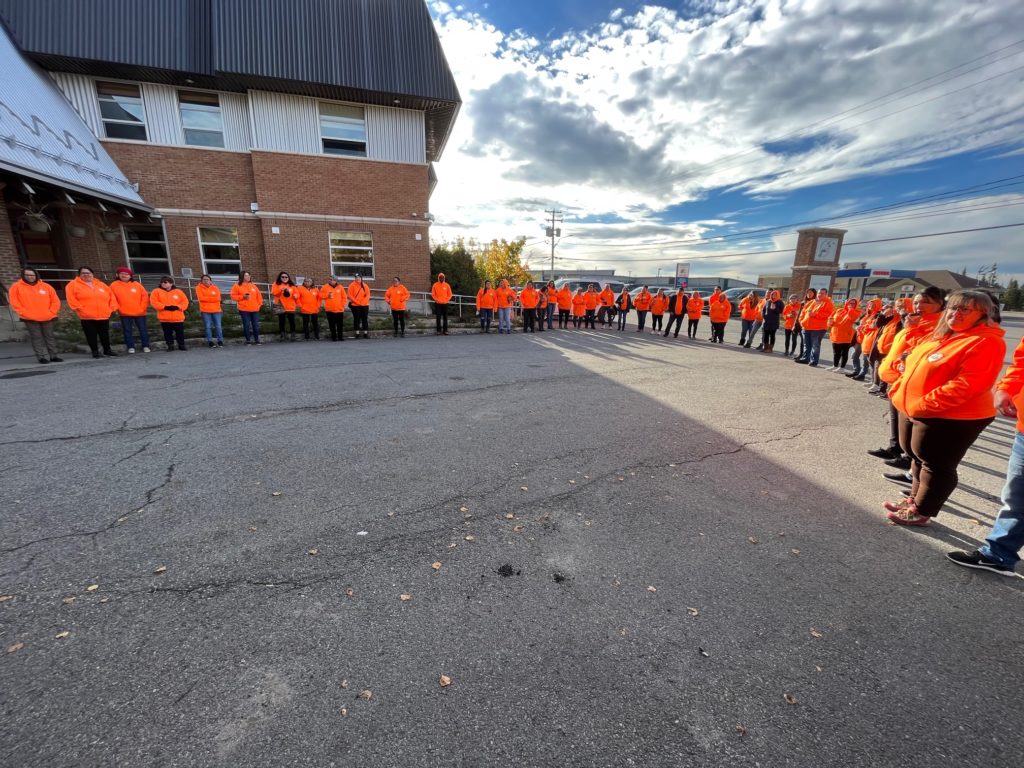Schools across Eeyou Istchee marked the National Day for Truth and Reconciliation on September 30 with several activities.
It was originally called Orange Shirt Day for the grassroots initiative started in 2013 by Phyllis Webstad, a residential-school survivor from British Columbia, who had her orange shirt taken away on her first day attending Mission Residential School. Schools and educators across the country have been using it as an opportunity to teach about what happened in residential schools.
At the Cree School Board’s head office in Mistissini, employees gathered in the parking lot to mark the occasion, starting with a prayer by Elders Henry and Bella Mianscum.
Henry used the opportunity to share his experience being taken on a plane to residential school, not knowing what was happening, and realizing only later the injustice of being taken away from his family. “I remember two people coming to the community, one was a man, and another one was dressed in red,” he said.
CSB Director General Caroline Mark then gathered employees in a circle and asked for residential-school survivors to enter the circle, followed by those with family or friends who attended. She explained that everyone in the communities is affected by what happened in the schools, that the CSB strives to ensure every child matters in the schools and communities.
Following a moment of silence to remember and honour the children who attended and those who didn’t make it home, CSB Secretary General Doreen Blackned offered a closing message about being a survivor of the schools.
At the École Luke Mettaweskum School in Nemaska, Principal David Lee said the students coloured their own orange shirts, which were used to decorate the schools. Students received traditional snacks that day, including Indian donuts, bannock and boudin.
In the school teepee, a community Elder read to elementary students from a storybook called Stolen Words. Meanwhile, secondary students watched a documentary film about residential schoolscalled We Were Children. They also had a guest speaker, Emily Henry, the Law Development Coordinator at Ochopowace First Nation in Saskatchewan. Later in the day, the school organized an Orange Shirt Day community walk with students, parents and other community members.

The Badabin Eeyou School in Whapmagoostui worked with Public Health, Child and Family Services, the Whapmagoostui Youth Council and the Cultural Department to organize their own community walk and games.
Deputy Chief Rita Sheshamush-Masty addressed the students, staff and community members about the importance of the day before beginning the walk. Afterwards, the youth council organized several games to showcase their resilience and strength.
In the evening, the community held an outdoor display and held games over the radio. Principal Ashley Burke said she was proud to have come together as a community to honour the survivors and children who didn’t make it home.
In Niagara Falls to mark the occasion, Prime Minister Justin Trudeau highlighted the recently appointed Special Interlocutor for Missing Children and Unmarked Graves and Burial Sites, Kimberly Murray, whose position was created after the discovery of mass graves at several former residential-school sites.
“On this day, which is also known as Orange Shirt Day, I invite everyone to listen to survivors and learn more about the history and legacy of the residential school system by participating in a local event or wearing an orange shirt,” said Trudeau. “Let’s take a moment today to participate, learn and reflect. We all have a role to play on the journey toward reconciliation.”
by Ben Powless, Local Journalism Initiative Reporter





